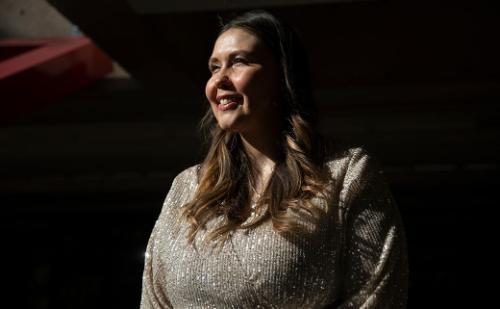Celebrating Teaching Excellence
Published27 May, 2021
Photo credit Tae Hoon Kim
Despite challenging conditions, CapU celebrates excellence in teaching.

When CapU’s campuses closed on March 17, 2020, in an effort to stem the tide of the pandemic, every department in the University had to adapt in order to ensure that students continued to receive a quality education. Faculty members felt the impact more than most.
“It was like a tsunami had swept them up, and there was no way off the wave,” said Laura MacKay, director of CapU’s Centre for Teaching Excellence (CTE).
It was the tail end of the spring term. Anxiety had been building across the city, as Vancouverites followed the news and tuned in to daily briefings by Dr. Bonnie Henry, B.C.’s provincial health officer. Final exams were just a few weeks away, and public health orders prevented students from attending classes and exams in person.
With education deemed an essential service, units across the University rallied to figure out how to support students remotely and continue operations. In one weekend, the CTE team created a teaching continuity website to support the 591 faculty in moving to remote learning. Over the next few months, they introduced new services such as one-on-one virtual consultations, workshops and training videos.

“We tried to keep it simple. Focusing on what needed to be online and how to connect with students.”
The challenge was immense. Before the pandemic, only three per cent of CapU’s courses were offered online or in mixed mode: a combination of online and in person. Faculty had to quickly master video conferencing software such as WebX and Microsoft Teams, understand privacy laws and put learning material online. Some prerecorded their lectures, while others delivered live lectures online.
Quizzes and exams had to be moved online without compromising academic integrity. Many faculty members mounted their exams on eLearn, CapU’s educational technology platform. Others made their exams open book and added short-answer questions or chose a different way to evaluate student work. The situation forced instructors to be creative, to look at course learning outcomes and figure out the best way to meet them through remote methods.
Creativity under pressure
While faculty audit their courses regularly, MacKay says at no time in history has every single faculty member had to reevaluate their course content simultaneously and in such a short period of time.
“There’s been changes in curriculum, in content, in activities, in assessments — lots of new things focused on what will help students, so that for sure is a big win,” said MacKay.
The circumstances have also led to teaching innovations, from more authentic and meaningful assessments (such as feedback from community partners on student-led projects) to faculty providing audio or video assessments to mixed mode classes with multiple camera setups where half the students attend in person and the other half attend remotely. Many of these innovations will carry on, benefitting students going forward.
While the majority of classes will be in person this fall, the University is planning for up to 35 per cent of courses to be offered online or in mixed mode — a clear benefit to students juggling work and family responsibilities and those with mobility issues.
Inspired teaching
On April 13, 2021, Capilano University presented five faculty members with Teaching Excellence Awards — Allen Stevens, Danielle Wills, Jane Ince, Justin Wilson and Sarah Yercich.
Nominated by their students, these five faculty members were recognized for their excellence in transformational learning, inclusive teaching practices, active learning techniques and innovative use of educational technology.
MacKay says it’s clear from student comments that each recipient had a significant impact on their students and helped to change the way they think about things.

“Allen puts his heart and soul into our lessons and discussions. His students never feel judged, and his feedback is always valuable.”

“Danielle supported our online learning by incorporating interesting teaching methods/tools, and excellent instruction, but what set Danielle apart was her willingness to help.”

“Jane showed me classes could be fun. She is engaging, raw and honest in her teaching. I transformed the way I saw my classes.”

“Justin is one of those teachers who really sees his students as people, which is particularly important when discussing very heavy, emotional topics.”

“Sarah is one of the most selfless profs I’ve had. She really cares about our well-being and is there for us when we are struggling.”
This year’s awards hold special meaning for MacKay. Despite the challenges of the pandemic, the CTE received a record number of nominations from students — 508 nominations for 218 faculty members. Filling out the nomination form takes time, and there’s no incentive for students to do it.
Although only five faculty members received awards, all 218 received the heartfelt student comments (with student names removed) so they could see the impact they’ve had on their students.
MacKay thinks the fact that so many students took the time to share why they felt their instructors were outstanding speaks volumes about the quality of teaching CapU provided during the pandemic. She isn’t surprised that 39 per cent of all teaching faculty were nominated by their students.
“We have fantastic researchers and industry professionals on faculty, and they are all fantastic instructors,” said MacKay. “That’s what unites us at CapU. That’s the role of a teaching institution. Our focus is on teaching, and we do a great job at it.”
She points to the 73 per cent engagement rate among faculty with the CTE, saying that it shows how invested faculty are in enhancing their teaching and doing the best they can to support students.
“The CTE wouldn’t be successful if faculty didn’t want to engage with us to learn new things, experiment, explore, innovate and improve their teaching.”



